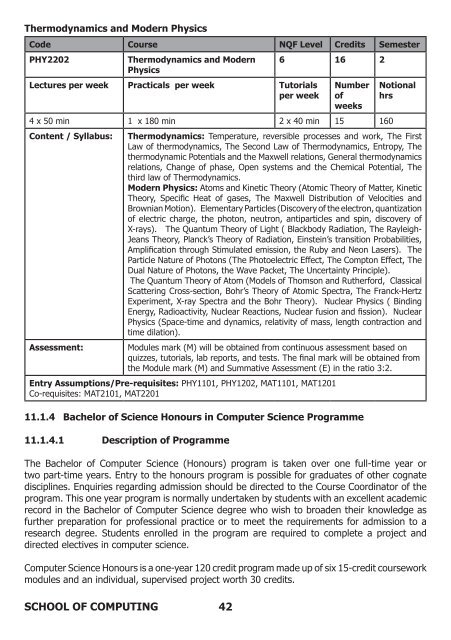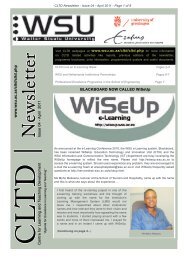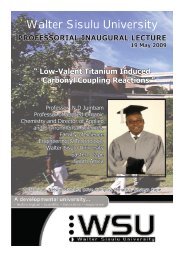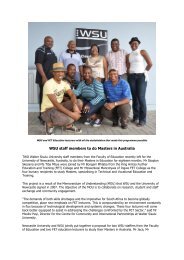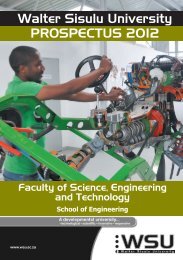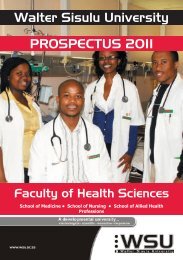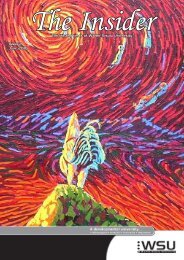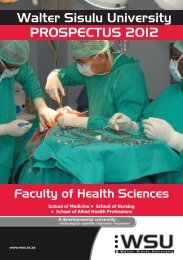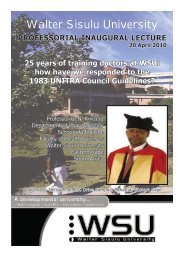School of Computing prospectus 2012 - Walter Sisulu University
School of Computing prospectus 2012 - Walter Sisulu University
School of Computing prospectus 2012 - Walter Sisulu University
Create successful ePaper yourself
Turn your PDF publications into a flip-book with our unique Google optimized e-Paper software.
Thermodynamics and Modern Physics<br />
Code Course NQF Level Credits Semester<br />
PHY2202 Thermodynamics and Modern<br />
Physics<br />
Lectures per week Practicals per week Tutorials<br />
per week<br />
42<br />
6 16 2<br />
Number<br />
<strong>of</strong><br />
weeks<br />
4 x 50 min 1 x 180 min 2 x 40 min 15 160<br />
Notional<br />
hrs<br />
Content / Syllabus: Thermodynamics: Temperature, reversible processes and work, The First<br />
Law <strong>of</strong> thermodynamics, The Second Law <strong>of</strong> Thermodynamics, Entropy, The<br />
thermodynamic Potentials and the Maxwell relations, General thermodynamics<br />
relations, Change <strong>of</strong> phase, Open systems and the Chemical Potential, The<br />
third law <strong>of</strong> Thermodynamics.<br />
Modern Physics: Atoms and Kinetic Theory (Atomic Theory <strong>of</strong> Matter, Kinetic<br />
Theory, Specific Heat <strong>of</strong> gases, The Maxwell Distribution <strong>of</strong> Velocities and<br />
Brownian Motion). Elementary Particles (Discovery <strong>of</strong> the electron, quantization<br />
<strong>of</strong> electric charge, the photon, neutron, antiparticles and spin, discovery <strong>of</strong><br />
X-rays). The Quantum Theory <strong>of</strong> Light ( Blackbody Radiation, The Rayleigh-<br />
Jeans Theory, Planck’s Theory <strong>of</strong> Radiation, Einstein’s transition Probabilities,<br />
Amplification through Stimulated emission, the Ruby and Neon Lasers). The<br />
Particle Nature <strong>of</strong> Photons (The Photoelectric Effect, The Compton Effect, The<br />
Dual Nature <strong>of</strong> Photons, the Wave Packet, The Uncertainty Principle).<br />
The Quantum Theory <strong>of</strong> Atom (Models <strong>of</strong> Thomson and Rutherford, Classical<br />
Scattering Cross-section, Bohr’s Theory <strong>of</strong> Atomic Spectra, The Franck-Hertz<br />
Experiment, X-ray Spectra and the Bohr Theory). Nuclear Physics ( Binding<br />
Energy, Radioactivity, Nuclear Reactions, Nuclear fusion and fission). Nuclear<br />
Physics (Space-time and dynamics, relativity <strong>of</strong> mass, length contraction and<br />
time dilation).<br />
Assessment: Modules mark (M) will be obtained from continuous assessment based on<br />
quizzes, tutorials, lab reports, and tests. The final mark will be obtained from<br />
the Module mark (M) and Summative Assessment (E) in the ratio 3:2.<br />
Entry Assumptions/Pre-requisites: PHY1101, PHY1202, MAT1101, MAT1201<br />
Co-requisites: MAT2101, MAT2201<br />
11.1.4 Bachelor <strong>of</strong> Science Honours in Computer Science Programme<br />
11.1.4.1 Description <strong>of</strong> Programme<br />
The Bachelor <strong>of</strong> Computer Science (Honours) program is taken over one full-time year or<br />
two part-time years. Entry to the honours program is possible for graduates <strong>of</strong> other cognate<br />
disciplines. Enquiries regarding admission should be directed to the Course Coordinator <strong>of</strong> the<br />
program. This one year program is normally undertaken by students with an excellent academic<br />
record in the Bachelor <strong>of</strong> Computer Science degree who wish to broaden their knowledge as<br />
further preparation for pr<strong>of</strong>essional practice or to meet the requirements for admission to a<br />
research degree. Students enrolled in the program are required to complete a project and<br />
directed electives in computer science.<br />
Computer Science Honours is a one-year 120 credit program made up <strong>of</strong> six 15-credit coursework<br />
modules and an individual, supervised project worth 30 credits.<br />
SCHOOL OF COMPUTING


